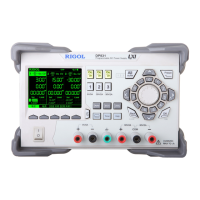RIGOL Chapter 3 Constant Current Tests
DP800 Performance Verification Manual
4. Turn on the electronic load; set the electronic load to work in CV mode and
adjust the voltage of the electronic load to the rated output voltage (please refer
to Table 1-1) of the channel (range) under test.
5. Turn on the digital multimeter; select DC voltage measurement function and set
the range to “Auto”. Make sure that the power supply is in CC mode. Read and
record the reading (U
0
, namely the voltage of the current sampling resistor) of
the multimeter.
6. Adjust the AC power supply to undervoltage state (namely the amplitude
reduces by 10%, refer to Table 2-6); read and record the reading (U
1
) of the
multimeter. Adjust the AC power supply to overvoltage state (namely the
amplitude increases by 10%, refer to Table 2-6); read and record the reading
(U
2
) of the multimeter.
Note: The upper limit of the overvoltage of DP800 series is 250Vac.
7. Calculate the voltage variations (namely the CC source effect, |U
1
-U
0
|/R
M
and
|U
2
-U
0
|/R
M
) and compare them with the specified specifications in Table 3-6.
8. Press the On/Off key corresponding to the channel under test at the front
channel to disable the output of the channel under test.
9. Repeat steps 1 to 8 to test the CC linear regulation rates of CH2 and CH3 until
finishing the CC linear regulation rate tests of all channels.
For the single channel model with multiple ranges of DP800 series (DP811A),
please first select a range and set the corresponding parameters of this range
in step 3 and then perform step 4 to step 8 to test the CC linear regulation rate
of this range. Then, repeat step 3 to step 8 to test the CC linear regulation rate
of the other range.
For the channels that support the Sense function of DP800 series, please
connect DP800, AC power supply, current sampling resistor, electronic load
and multimeter according to Figure 3-2 and turn on the Sense function of the
channel after selecting the current channel in step 3.

